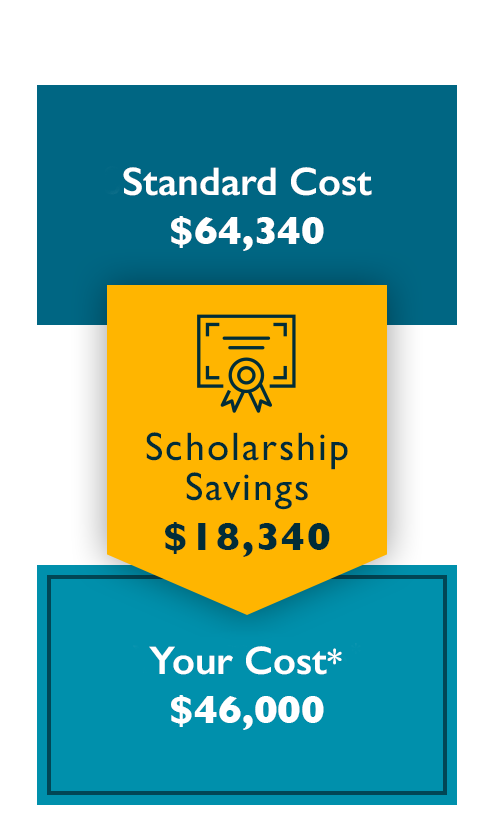Degree Completion Requirements
-
181 quarter credits (1 semester credit equals 1.5 quarter credits)
-
General education courses (46 cr.)
-
Core courses (55 cr.)
-
Concentration courses (25 cr.)
-
Elective courses (50 cr.)
-
Capstone course (5 cr.)
-
Students may be eligible to transfer up to 135 credits*. At least 45 credits must be completed at Walden.
*Please note: Students that reside in Virginia may be eligible to transfer up to 125 credits. At least 55 credits must be completed at Walden.
View the COMPLETE CURRICULUM PLAN.
Time to completion will vary by student, depending on individual progress and credits transferred, if applicable. For a personalized estimate of the number of your transfer credits that Walden would accept, call an Enrollment Specialist at 844-855-5613.
Curriculum
Degree Completion Requirements
The Tempo Learning® option1 is ideal for busy working professionals like you. Your progress is measured by the mastery or demonstration of skills, abilities, and knowledge in a particular area of study.
Each competency has been carefully designed by expert faculty with input from employers, with your education and future employment in mind.
Students may be eligible to transfer up to 135 credits*. At least 45 credits must be completed at Walden.
*Please note: Students that reside in Virginia may be eligible to transfer up to 125 credits. At least 55 credits must be completed at Walden.
View the COMPLETE CURRICULUM PLAN.
Time to completion will vary by student, depending on individual progress and credits transferred, if applicable. For a personalized estimate of the number of your transfer credits that Walden would accept, call an enrollment advisor at 844-767-9522.
The BS in Health Studies program with a specialization in Health Promotion and Wellness includes the following competencies grouped within these Areas of Expertise.
-
180 quarter credits
-
General education courses (45 cr.)
-
Core courses (55 cr.)
-
Concentration courses (25 cr.)
-
Elective courses (50 cr.)
-
Capstone course (5 cr.)
-
Admission Requirements
Admission is considered for adult students who hold a high school diploma or its equivalent. Applicants must also meet one of the following criteria:
- You are 21 years of age or older.
- You are less than 21 years of age with at least 12 quarter credits.
- You are an active member of the military or a veteran with documentation of service.
More information for international applicants.
| Curriculum Component | Requirements | Cost | Amount |
|---|---|---|---|
| Tuition | 181 quarter credit hours | $340 per quarter hour | $61,540 |
| Program Fee | Per quarter | $175 | $2,800 |
| $64,340** | |||
| BELIEVE & ACHIEVE SCHOLARSHIP YOUR TUITION | -$18,340 $46,000* | ||
*Represents course-based learning format, minimum time to completion, no transfer of credit, and Believe & Achieve Scholarship. Your actual total program time and costs may vary. Believe & Achieve Scholarship savings based on current tuition. See Scholarship Details for more information.
**Tuition reflects the minimum time to completion. Time to completion varies by student, depending on individual progress and credits transferred, if applicable. Tuition and time to complete may be reduced if transfer credits are accepted, or if you receive grants, scholarships or other tuition reductions. Walden may accept up to 135 transfer credits. For a personalized estimate of the number of your transfer credits that Walden would accept, call an Enrollment Specialist at 844-768-0109.
Tuition and fees are subject to change. Books and materials are not included and may cost up to an additional $5,000.
Progress at Your Pace. Control Your Cost.
Walden’s Tempo Learning® programs follow a subscription-based pricing format. Students are billed a flat-rate for each 3-month subscription term. All pricing is represented in U.S. dollars and is subject to change.
| Program | Subscription Period Tuition | Subscription Period PROGRAM Fee | Subscription Period Time Frame |
|---|---|---|---|
| BS in Health Studies | $2,650 | $175 | 3-month subscription period |
| You may be able to complete your BS in Health Studies degree in 20 months for under $18,000.* | |||
*Represents Tempo Learning® format, Believe & Achieve Scholarship, and the fastest pace of our top 25% transfer students in this program in the Tempo Learning® format. Your actual total program time and costs will depend on your individual pace and transfer credits. A student’s pace is usually determined by their experience, ability to work independently, and availability. Believe & Achieve Scholarship savings based on current tuition. See Scholarship Details for more information.
Financial Aid
Financial aid is available for this program. Our financial aid advisors can help you identify funding opportunities to help you pay for your education.
With Tempo Learning, you may be able to complete your BS in Health Studies degree in as few as 20 months for as low as $15,000.*
*Represents Tempo Learning® format, Believe & Achieve Scholarship, and the fastest pace of our top 25% transfer students in this program in the Tempo Learning® format. Your actual total program time and costs may vary. Tuition and fees are subject to change. See Tuition and Fees section and Scholarship Details for more information.
Testimonials
I chose Walden University because many of my colleagues were alumni. They highly recommended Walden for the working professional who seeks outstanding professor engagement throughout all courses.
Related Articles
1Walden University’s competency-based options are priced as an all-you-can learn model, where students subscribe to three-month learning periods instead of paying for courses or credit hours. Walden offers monthly starts, the first Monday of every month, for the competency-based option.
Note on Certification:
The BS in Health Studies program with the Health Promotion and Wellness concentration has been designed to reflect the Seven Areas of Responsibility for Health Educators outlined by the National Commission for Health Education Credentialing (NCHEC) to prepare students to sit for the national Certified Health Education Specialist (CHES) exam. Walden enrollment specialists can provide information relating to national certification exams; however, it remains the individual’s responsibility to understand, evaluate, and comply with all requirements relating to national certification exams for the state in which he or she intends to practice. Walden makes no representations or guarantee that completion of Walden coursework or programs will permit an individual to obtain national certification. For more information about the CHES exam, students should visit www.nchec.org.











